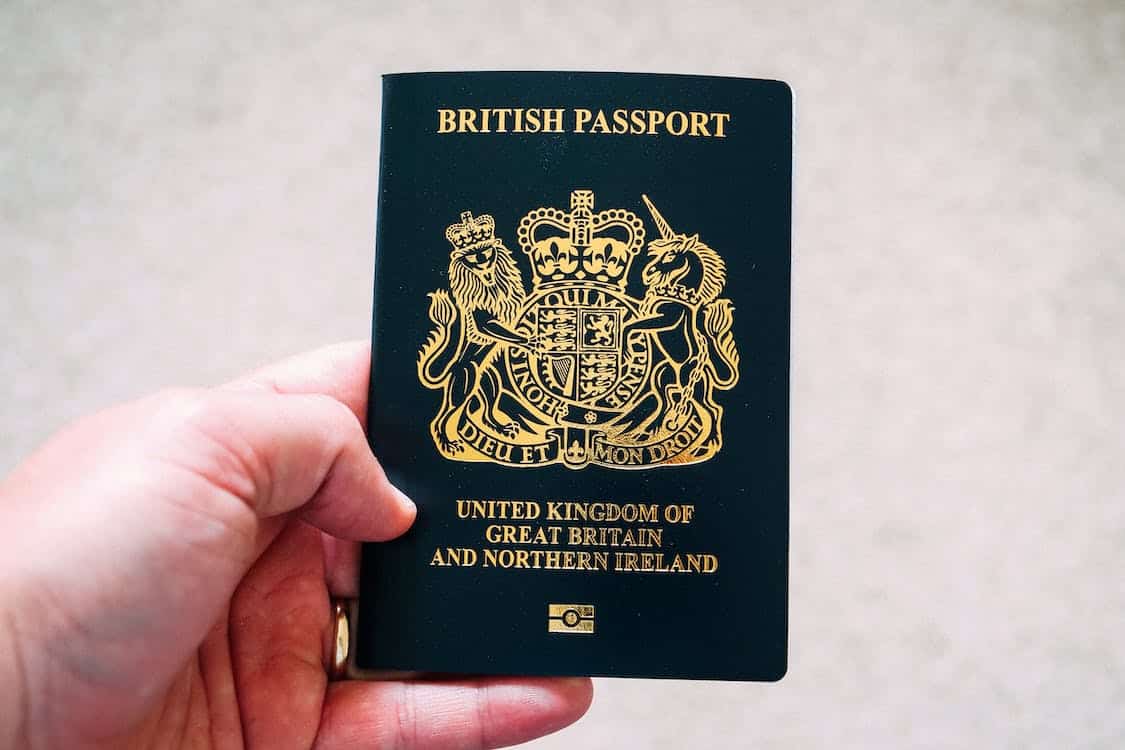When planning for a long-term life in the United Kingdom, you must weigh your options for permanent residency between the UK’s Indefinite Leave to Remain (ILR) and becoming a British citizen.
This article will provide information on how to achieve settled status to live in the UK permanently and what you should consider when settling in the UK by ILR vs citizenship.
Indefinite Leave to Remain versus British Citizenship

ILR, or Indefinite Leave to Remain and British Citizenship, offer certain privileges, including permanent legal residency and the right to work for foreigners living in the United Kingdom. Since these two statuses are similar in many ways, many foreign nationals need clarification of their differences.
Before going through any process of making the UK your permanent home, you must clearly understand both of these concepts. While ILR will give you the freedom to reside and work in the UK, it doesn’t have many advantages and fundamental rights that British citizens possess.
Let us take a deeper look at each of these concepts to help you decide which one is best for you.
The Definition of Indefinite Leave to Remain
Indefinite Leave to Remain is a unique settlement visa that allows foreigners living and working in the UK to remain permanently without further requirements for visas or residency permits.
If you possess settled status by ILR in the UK, you’re no longer bound by immigration rules regarding how long you can stay in the country. It grants you the freedom to leave and enter the country as you wish, without explaining your purpose of traveling to UK border control.
Of course, there are specific rules in the UK for Indefinite Leave to Remain. But even then, Indefinite Leave to Remain proof is a stepping stone toward acquiring British citizenship.
How to obtain Indefinite Leave to Remain status?
The Indefinite Leave to Remain requirements vary depending on your immigration status in the UK. An Indefinite Leave to Remain application can be submitted under the following visas:
- Work Visa
- Family Visa
- You have maintained a continuous residence period in the UK for ten years
- Ancestry Visa
- Retirement Visa
- Investor Visa
- Innovator Visa

These qualifying visa types have different eligibility criteria. For example, Indefinite Leave to Remain allows a spouse in the UK to apply in as little as two years. In contrast, someone on a Skilled Worker Visa can only apply for Indefinite Leave to Remain after five years of continuous residence in the UK before they’re eligible to submit an ILR application.
The minimum requirements for all ILR applicants are that:
- They don’t have any immigration infringement records or criminal convictions as minors or adults while they have lived in the UK
- They must meet the residency requirements for ILR. They should not spend more than the time limit specified regarding the number of days outside of the country.
- They must be able to prove English language proficiency through any qualifying UK test or as part of a university degree fulfillment
- They must pass the Life in the UK Test to prove they carry subjective and in-depth knowledge of British traditions and history, society, and culture.
The following table shows the continuous residence period required for each UK visa category before applying for ILR:
| Category | Time Spent in the UK |
| Married to or in a civil partnership with any UK Citizen | Two years |
| Long stay Visa (Lawful stay in the country) | Ten years |
| Unlawful and illegal stay | 14 years |
| Tier 1 Investor Visa | Two years |
| (£10 million investment) ($12.05 million) | |
| Three years | |
| (£5 million investment) ($2.41 million) | |
| Five years | |
| (£2 million investment) ($2.41 million) | |
| Tier 2 Work Permit | Five years |
| UK Ancestry Visa | Five years |
| Retired Person Visa | Five years |
| Innovator Visa | Three years |
Student visas, intra-company transfer visas, Start-up visas, and Youth Mobility Scheme visas (Tier 5 visas) are not eligible for ILR.
Benefits of the ILR status
- You can enjoy permanent lawful residence in the UK and work any job permanently without worrying about visa extensions and immigration restrictions.
- You can access the UK benefits system.
- You do not need to pay the Immigration Health Surcharge (IHS) fee to access the National Health Service (NHS).
- You’re at the final step of acquiring British citizenship through naturalization.
To learn more about Indefinite Leave to Remain (ILR), read the article Permanent Residence UK
Definition of British Citizenship
British citizenship is the ultimate residency status in the UK. It offers a wide array of lucrative benefits, including unconditional freedom to go in and out of the country and fundamental rights such as voting. You must already have an ILR status before you’re eligible to apply to become a British citizen.
Upon becoming a British citizen, you can obtain a British passport, meaning you can travel overseas as a British national.
The following are the minimum requirements under which UK citizenship can be granted:
- You were born in the UK
- You have British parents
- You are currently stateless
- You have renounced your previous citizenship status
- You have possessed ILR status for 12 months

Benefits of British citizenship
- You can apply for citizenship for your children under 18 years of age, even if they were born outside the UK.
- You’re eligible to vote in all UK local and general elections and even campaign for office as a British national.
- You can apply for a UK passport, which gives you visa-free travel, including visa-on-arirval to over 160 countries worldwide and easy re-entry into the UK.
- You have the right to benefits and assistance from the UK government within the UK and abroad.
- The UK Nationality and Borders Act allows British nationals to hold dual nationality with other countries.
Find out more about the requirements for British Citizenship in our complete guide.
Indefinite Leave to Remain versus British Citizenship: Basic Differences
In the Indefinite Leave to Remain versus British citizenship debate, it is essential to note that ILR and British citizenship both offer some extraordinary privileges. Thus, their fundamental difference comes down to the advantages you can get with each.
ILR has a time limit for overseas travel
While having an ILR status allows you to settle permanently in the UK, there are some basic regulations that can apply to this status. For example, if you stay outside the country for more than two years, your Indefinite Leave to Remain residency status will be revoked. Whereas if you’re a British national, there is no time limit for how many years you can reside abroad, nor do you need to make arrangements to return legally.
British citizens have more rights
One of the advantages of British citizenship over ILR is that ILR does not provide you with the same rights that British nationals have access to, such as voting rights and consular assistance abroad.
No British passport for ILR holders
You are not eligible to obtain a British passport if you just have Indefinite Leave to Remain status.
ILR paves the way to British citizenship
Unless you have ties to the UK through ancestry or birth, it is essential to possess ILR before legally applying for British citizenship.
British citizenship has additional steps
After your citizenship application has been granted, a ceremony must be attended before you’re presented with a certificate of naturalization. Following this, you can apply for a British Passport.
With ILR applications, however, upon success, you are simply sent a Biometric Residence Permit (BRP) as proof of your immigration status.
Things to Consider Before Choosing ILR or UK Citizenship
ILR residency requirements
Indefinite Leave to Remain enforces a specific rule regarding the nature of residency in the UK. All ILR permit holders are bound by a two-year limitation for staying outside the UK. Your permit will be canceled if you remain abroad for longer than two years while holding an ILR settled status.
Furthermore, you will need a Returning Resident Visa to re-enter the UK legally before applying to reinstate your settled status.
The decision to reinstate leave to remain indefinitely lies with the UK Home Office. You must prove your intent to continue your work and permanently reside in the country. This may require assistance from an immigration lawyer.

Fees
The Indefinite Leave to Remain fee is currently £2,404 ($2,900) per application. It usually takes six months for a decision to be made. The UK offers a super-priority service for an additional fee of £500 ($600) per applicant to receive a decision in five working days and £800 ($965) per applicant to receive a decision the next working day.
Lifetime validity of British citizenship
Of course, certain legal complications can lead to the revocation of your permanent British citizenship, such as fraudulent applications or actions that threaten national security, but these circumstances are uncommon.
Once you become a permanent British citizen, you are free to live abroad or enter and exit the country as you wish.
Benefits of having a British passport
Rated in the top ten countries in the Global Passport Index, the UK has one of the most powerful passports in the world, with visa-free travel (including visa-on-arrival) to 170 countries. Many travelers also find entry into foreign countries much easier due to the trust that comes with a British passport.
You can re-enter the country quickly by using the biometric information on your passport, which allows you to avoid long immigration queues at UK border control.
Great Britain has several overseas territories around the world, such as the Cayman Islands in the Caribbean and Gibraltar in Europe. As a British passport holder and citizen, moving to these territories is much easier than for foreign nationals.
Enjoying voting rights
According to UK legislation, only a permanent resident of the country possesses voting rights. If you have British citizenship, you are eligible to vote in all parliamentary processes.
How to get ILR in the United Kingdom through the Investor Visa
One of the most convenient ways of obtaining Indefinite Leave to Remain in the UK is by applying through an Investor Visa. The Investor Visa, also known as a Tier 1 Visa, is an excellent opportunity for high net-worth individuals (HNWI) who want to settle in the UK and enjoy permanent residence.
This Investor Visa can be a stepping stone for foreigners looking to secure British citizenship. This process is relatively fast and follows an expedited route where you can be granted Indefinite Leave to Remain in as little as two years, provided you meet the investment requirement.
The following criteria must be fulfilled to obtain an Investor Visa.
- The applicant must be 18 years of age or above
- The applicant must have at least £2 million ($2.41 million) to be eligible
- Your original country of residency must be outside the European Economic Area(EEA)
In addition to the above conditions, you should be able to demonstrate the source and ownership of your funds.
Make sure the funds are accessible through any reputable financial institution in the UK and that they can be spent and utilized in the country. In the case of funds accumulated in under two years, you’re required to disclose a detailed source of origin.
The Home Office is ultimately responsible for inspecting and allowing all foreign funds to be considered for Investor Visas.
Find out more about the Tier 1 Investor Visa in this article.
Benefits of having an Investor Visa
Once you possess a Tier 1 Visa, you are eligible to apply for Indefinite Leave to Remain after two, three, or five years depending on your investment amount.
Typically, you must maintain continuous residence in the country until you’re eligible to submit an ILR application. Check the rules of eligibility for ILR applications beforehand.
Innovator Visa
Additionally, you also have the option of the Innovator Visa. The Innovator Visa is for experienced entrepreneurs and businesspersons who want to establish a new business in the UK. The idea for your business must be innovative, viable, and scalable.
The fundamental differences between the Investor and Innovator visas are that the Innovator Visa requires a much lower investment at £50,000 ($41,500), but you need an endorsement for your idea from an approved UK endorsing body. You’re also expected to be much more involved with business activities.
An individual with an Innovator Visa can apply for Indefinite Leave to Remain after three years.
Acquiring UK Citizenship after ILR

You can apply for British citizenship through naturalization after you’ve gone through Indefinite Leave to Remain for a specified number of years. The application can be made online or by post. However, you will have to wait for a minimum of twelve months after being granted the settled status before you’re eligible to apply for your citizenship.
This process is time-consuming and involves many strict criteria besides ILR.
- You must not spend more than 450 days in the last five years or more than 90 days in the previous year outside of the country. For those married to a British citizen or have a civil partner, days outside the country must not have exceeded 270 in the last three years.
- You must pass the English language proficiency test and the Life in the UK Test.
- You should not possess any criminal records or administrative offenses for the whole duration of your residence.
- You must meet the ‘Good Character’ provision. To elaborate, you must pay regular income tax and make national insurance contributions, etc.
Final Words
As explained throughout this article, there are significant differences between Indefinite Leave to Remain and British Citizenship, as ILR does not quite provide the same level of rights and status as citizenship. Though both offer some valuable privileges, you must take note of the advantages you access when transferring from ILR to citizenship.
You can easily acquire citizenship after ILR if you meet the requirements on your ILR application form. For more information on ILR vs citizenship, please feel free to reach out to our qualified immigration experts.
If you want to know more about UK visas and British citizenship, have a look at these articles:
- Innovator Visa UK
- Entrepreneur Visa UK
- UK Citizenship By Investment – The Ultimate Guide By Experts
- UK Citizenship by Descent
- Everything about the British Citizenship Application
- Permanent Residence UK
- British Citizenship: How to Become a British Citizen and Live Legally
- Global Talent Visa UK
- UK Secondment Worker Visa – All You Need to Know!
- UK Expansion Worker Visa – The Ultimate Guide by Experts
- UK Graduate Trainee Visa: Expert Guide 2024
- UK Visa: Options Open to You and How to Apply
- Start-Up Visa UK
Frequently Asked Questions about Indefinite Leave to Remain UK versus British Citizenship
Is ILR a form of citizenship?
ILR is a form of permanent settled status in the UK, but it does not offer the same advantages as citizenship.
How long after obtaining Indefinite Leave to Remain can you become a British citizen?
After possessing the status of ILR for twelve months, you can apply for British citizenship.
Can I apply for ILR and citizenship at the same time?
You cannot apply for ILR and citizenship at the same time. You must have held the status of ILR for twelve months before you can apply for citizenship.
Is permanent residence the same as citizenship in the UK?
No. Permanent residence does not offer the same benefits and privileges as UK citizenship.
When can I apply for my ILR status?
Indefinite Leave to Remain can be applied for after you have maintained the relevant qualifying period of two, three, five, or ten years of continuous lawful residence in the UK.
How long does a British citizenship application take?
It takes about six months to process a UK citizenship application. The processing time can be reduced to five working days or one working day for an additional fee. You need to attend the UK citizenship ceremony within three months of the approval of your citizenship application.
Can I apply for ILR?
You can apply for ILR if:
- You are married to or in a civil partnership with a UK Citizen and have lived in the country continuously for at least two years
- You have maintained a Long Stay Visa (Lawful stay in the country) for ten years
- You have a Tier 1 Visa and have lived in the country for a continuous period of at least two years
- You have a Tier 2 Work Permit and have lived in the country for a continuous period of five years
- You have an Ancestry Visa and have lived in the country for a continuous period of five years
- You have a Retirement Visa and have lived in the country for a continuous period of five years
- You have an Innovator Visa and have lived in the country for a continuous period of three years
Who can get Indefinite Leave to Remain?
Anyone in the UK with a long-term residency visa can obtain Indefinite Leave to Remain if they:
- Have lived in the UK for the period required for their current visa
- Have fulfilled the continuous residence duration
- Do not possess any criminal records or immigration infringements
- Have passed the English language knowledge test or possess a relevant English language qualification
- Have passed the Life in the UK Test


